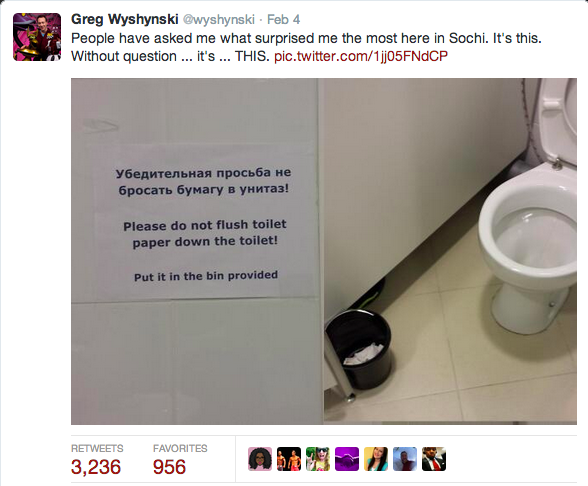My first overseas trip as a journalist was to the Caribbean island of Grenada in the summer of 1983, when it was a fledgling third-world socialist country. Its infrastructure wasn’t reliable, particularly the plumbing. Turn on the shower head, and nothing. So I did what Grenadians often did: grab a bar of soap at the first sound of an afternoon rain and step outside in the buff to bathe.
This is the first time I’ve written about that shortcoming of the trip because it wasn’t germane to the reason I was there. I was there to write about how Grenada was trying to transform itself with a new economic strategy, just as American journalists have traveled to Sochi, Russia, this week to report primarily on the competition at the 2014 Winter Olympics.
Instead, they’ve written and tweeted mostly so far about their commodes.
[Below, Greg Wyshynski, editor of the Puck Daddy blog on Yahoo! Sports, posts on Twitter his concerns about the facilities in Sochi.]
Their toilets come with instructions not to flush the toilet paper. Water from the spigot isn’t crystal clear. The sheets on the hotel bed appears soiled. The lights aren’t working and the Internet connection is down.
Welcome to the rest of the world. People in it put up with a little less than we do.
These sorts of stories, which often raise themselves at global sporting events, make my eyes roll. They are symptomatic of what happens when a cloistered press, the U.S. sports media in particular, is forced out of its comfortable confines into the vagaries that foreign correspondents put up with all the time without so much as raised eyebrow. It is cultural snootiness.
It reminds me of the complaints at the Barcelona Summer Olympics in ’92. Most of us were housed in quarters lacking air-conditioning during what was a particularly humid Mediterranean summer. How could they? And we have to share bathrooms? What heathens!
This is what happens when a bunch of American journalists who, if they do travel abroad avoid second- or third-world countries unless they include some cordoned-off all-inclusive resort, conflating less-than five-star or suburban America or urban-bubble American accommodations (like gritty re-gentrified DC with a French bistro on every corner) into international stories of shock and awe. It isn’t news in parts of the world that the sewer system can’t handle paper products and you are asked to deposit toilet paper in a bin. Even here in idyllic Montgomery County, Maryland, nestled next to our nation’s capital, the sanitary commission recently warned residents not to dispose in the toilet those “flushable” wipes you wash your toddler’s bottom with because they frequently clogged the sewer system.
Now, that is a story that effects everyone and is worthy of coverage. Having to do so in bathrooms in journalists’ accommodations at the Sochi games is not.
Journalists should cover stories, not create them. But what we’ve been treated to the past few days out of Sochi are dog-bites-journalists’ stories that impact no one but them.
If American journalists, in particular, want to write about living conditions in the part of the world they’ll be living in this month, they should venture out of the Sochi bubble and see how Russians elsewhere live. (In South Africa at the World Cup, most American journalists lived with U.S. Soccer officials in a gated, guarded enclave that resembled any galleria shopping neighborhood in the U.S.) If athletes were suffering, that would be one thing. But they aren’t. Reuters reported athletes are pleasantly surprised against the reports of the appalled journalists, some of whom I count as friends and other as acquaintances.
Early reports from Sochi also suggest a historic ignorance or collective amnesia. A bomb or two went off in Athens before those games started, the first after 9/11. A number of star athletes in this country refused to participate due to terrorism concerns. All of us who went from this country to Athens were required to undergo terrorism disaster training. (I still have the emergency kits we were required to carry replete with burn gel, gas masks and other such items should chaos have erupted.)
I covered the bombings in the London tube the day after London was awarded the 2012 Summer Olympics. And people seem to have forgotten that the Mexican military and police massacred several hundred, maybe one thousand, protesting students in Mexico City 10 days before it hosted the ’68 Games. There were calls for some delegations to pull out because of the atmosphere.
Clearly, Sochi is significantly more tense with the disenchanted Chechnyans so close. But much of the early reporting was reactionary. And that which revolved around accommodation inconveniences wasn’t even newsworthy.
Let the games begin, indeed, if for no other reason than to force journalists who are there to cover them and do their job.






Leave a Comment